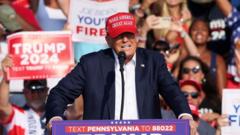Lula's firm stance comes in response to threats from US President Donald Trump, who seeks a 50% import tax on Brazilian goods, alleging unfair treatment of Bolsonaro. Lula has rejected Trump's claims and reaffirmed Brazil's commitment to sovereign governance.
**Brazil Ready to Respond to US Tariff Threats Amid Bolsonaro Controversy**

**Brazil Ready to Respond to US Tariff Threats Amid Bolsonaro Controversy**
Brazilian President Luiz Inácio Lula da Silva vows to implement reciprocal tariffs as tensions rise with the United States over former President Jair Bolsonaro's trial.
In a wave of escalating trade tensions, Brazilian President Luiz Inácio Lula da Silva has declared his readiness to impose matching tariffs in retaliation against any punitive measures introduced by the United States. This declaration follows a provocative statement from US President Donald Trump, who threatened a staggering 50% import tax on Brazilian goods effective August 1, citing Brazil's treatment of former President Jair Bolsonaro as justification.
Trump's letter accused Brazil of conducting a “witch hunt” against Bolsonaro, who is currently embroiled in legal issues, including a trial for allegedly trying to stage a coup following the 2022 election loss to Lula. In his letter, Trump referred to Bolsonaro as “a highly respected leader throughout the world,” and his support for the former president should hardly come as a surprise, given their longstanding alliance.
The tariff threat prompted a prompt and robust rebuttal from President Lula, who emphasized Brazil’s sovereignty and independence in a post on social media platform X. He stated that any unilateral increase in tariffs from the US would trigger an equivalent response from Brazil, thus reinforcing the notion of fair trade practices.
The implications of such a tariff increase are significant, as the United States is Brazil's second-largest trading partner, just behind China. Moving from a 10% to a potential 50% tariff would inflict severe damage on Brazilian exports, which include key commodities like iron, gas, and coffee, underscoring the economic stakes involved.
Moreover, Lula challenged Trump’s assertion regarding the US's trade deficit with Brazil, labeling it "inaccurate" and pointing to US government data indicating a trade surplus of $7.4 billion with Brazil in 2024. This contradiction adds another layer of complexity to the ongoing dialogue between the two nations.
Trump's threats have not been limited to Brazil; nations like Japan, South Korea, and Sri Lanka also received warnings of potential tariff hikes. However, the particular focus on Brazil and the accompanying political implications surrounding Bolsonaro have created a unique situation.
Political analysts suggest that while the rhetoric may seem damaging, it could inadvertently enhance Lula's domestic support, as citizens may rally around their leader facing external pressures. Experts stress the importance of a coherent and united strategy from the Lula administration to navigate these tensions effectively and leverage any potential political gains.
As the unfolding situation develops, it remains to be seen how Brazil will respond to these challenges in the context of its bilateral relations with the United States, and what ramifications these tariff threats will have on the global trading landscape.
Trump's letter accused Brazil of conducting a “witch hunt” against Bolsonaro, who is currently embroiled in legal issues, including a trial for allegedly trying to stage a coup following the 2022 election loss to Lula. In his letter, Trump referred to Bolsonaro as “a highly respected leader throughout the world,” and his support for the former president should hardly come as a surprise, given their longstanding alliance.
The tariff threat prompted a prompt and robust rebuttal from President Lula, who emphasized Brazil’s sovereignty and independence in a post on social media platform X. He stated that any unilateral increase in tariffs from the US would trigger an equivalent response from Brazil, thus reinforcing the notion of fair trade practices.
The implications of such a tariff increase are significant, as the United States is Brazil's second-largest trading partner, just behind China. Moving from a 10% to a potential 50% tariff would inflict severe damage on Brazilian exports, which include key commodities like iron, gas, and coffee, underscoring the economic stakes involved.
Moreover, Lula challenged Trump’s assertion regarding the US's trade deficit with Brazil, labeling it "inaccurate" and pointing to US government data indicating a trade surplus of $7.4 billion with Brazil in 2024. This contradiction adds another layer of complexity to the ongoing dialogue between the two nations.
Trump's threats have not been limited to Brazil; nations like Japan, South Korea, and Sri Lanka also received warnings of potential tariff hikes. However, the particular focus on Brazil and the accompanying political implications surrounding Bolsonaro have created a unique situation.
Political analysts suggest that while the rhetoric may seem damaging, it could inadvertently enhance Lula's domestic support, as citizens may rally around their leader facing external pressures. Experts stress the importance of a coherent and united strategy from the Lula administration to navigate these tensions effectively and leverage any potential political gains.
As the unfolding situation develops, it remains to be seen how Brazil will respond to these challenges in the context of its bilateral relations with the United States, and what ramifications these tariff threats will have on the global trading landscape.




















